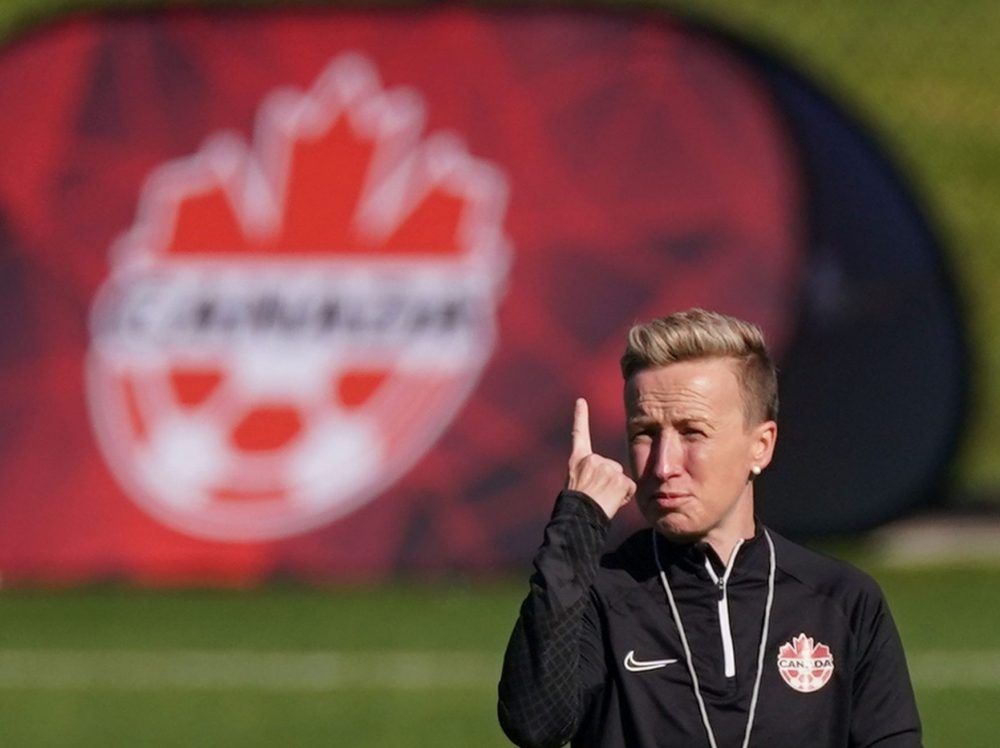After getting a taste of gold at the Tokyo Olympics in 2021, the Canadian women’s national team is hungry for more.
With the FIFA Women’s World Cup kicking off on Thursday in Australia and New Zealand, Team Canada will have an opportunity to add to a trophy cabinet that seems to get more crowded every tournament.
Though Canada is ranked No. 7 in the world, the odds aren’t exactly in the team’s favour.
Being drawn into Group B with the Matildas, being down a few key players due to injury and facing turmoil with Canada Soccer over wage equality with the men’s team are all factors that could slow the team down.
But there are reasons to believe too, with several young players capable of emerging as stars on the global stage.
Here’s seven things to know before the tournament kicks off Down Under.
1. The GOAT’s still here
At 40 years old, Christine Sinclair is back for her sixth Women’s World Cup, although her role isn’t what it has been for most of her career.
With 190 international goals – the most by any soccer player in their career – you would think that Sinclair would be the first name on the team sheet up top.
Instead, the captain is slotting into more of a playmaking and facilitating role, allowing the team’s younger forwards to take over.
Having gone scoreless in her past 12 international games and with just five goals in her past 33, this tournament likely is Sinclair’s last chance at a World Cup.
2. Off-field distractions
The run up to the Women’s World Cup has been anything but smooth for Canada.
The team threatened to boycott the SheBelieves Cup over a pay dispute with Canada Soccer earlier this year before reaching an interim agreement. While the team did play in that tournament, it did so under protest, wearing shirts with the slogan “Enough is enough” during pre-game warm-ups.
Canada finished last in the four-team tournament and then didn’t even get a proper send-off game at home, much to the chagrin of team members.
3. Who’s the boss?
That would be Bev Priestman, who took over when John Herdman left to take over Canada’s men’s team in 2018.
All Priestman has done since taking the reins is improve on what Herdman had built, having won back-to-back Olympic bronze medals in 2012 and 2016.
Priestman upped the ante by taking home gold at the Tokyo Games in 2021 and now faces the tough task of becoming the first team to win the Women’s World Cup as defending Olympic champions since the U.S. won at the 1996 Olympics and 1999 WWC.
Priestman has been in a tricky spot over the past year, having to straddle the line between supporting her players while also being closely tied to Canada Soccer during the tumultuous CBA negotiations.

4. Who’s missing?
Canada’s starting lineup should be largely unchanged from its Olympic gold medal win in 2021, with one big exception: Janine Beckie.
The Portland Thorns forward tore her ACL earlier this year, ruling her out for the tournament.
Beckie’s absence will put added pressure on veteran forwards Adriana Leon, Nichelle Prince and 22-year-old Jordyn Huitema. Also look for tireless winger Jessie Fleming to get in on the action, as she often does.
Veteran midfielder Desiree Scott also was left off the roster while still recovering from knee surgery. She had played at each of the previous three World Cups.
5. Who’s up first?
Canada’s first match kicks off on Thursday night at 10:30 p.m. ET against Nigeria.
While Canada is a heavy favourite to take all three points from the opener, the Super Falcons should not be overlooked. Nigeria has won the Africa Cup of Nations a record 11 times and has qualified for every Women’s World Cup. Despite that record, it has advanced from the group stage just twice and reached the quarterfinals once, in 1999.
Asisat Oshoala is the player to watch up front. The 28-year-old plays her domestic football for Spanish powerhouse Barcelona, has a prolific scoring record for both club and country, and has named the African Women’s Footballer of the Year five times.
Goalkeeper Chiamaka Nnadozie has been tipped as a rising star, too, while veteran defender Onome Ebi is set to become the first African to play in six World Cups.
6. What is on deck?
After Thursday’s match with Nigeria, Canada then faces the Republic of Ireland on Weds., July 26 at 8 a.m. and then finishes group-stage play against hosts Australia on July 31 at 6 a.m.
The match against Australia could very well be for the top spot in Group B if both teams hold serve in their first two games.
But, in these sorts of international tournaments, upsets happen all the time.
7. How far can Canada go?
Considering the women knocked off the heavily favoured Americans in the Olympic semifinals before taking the gold against Sweden in a penalty shootout, hopes are high.
But, Canada’s history at the World Cup has been a sore spot for the team.
Canada has made the semifinals just once back in 2003 and lost in its first knockout stage game four years ago.
With Group B considered this year’s Group of Death, Canada has a hard road ahead. Unless it can unseat co-hosts Australia and win the group, a date with powerhouse England could await in the Round of 16 as the likely winners of Group A.
With Canada’s betting odds to win it all at 34-1 – which is 10th-best at the tournament – this team should be considered more of a darkhorse than a true favourite.
But, coming off an Olympic gold, it will be hard to dampen expectations that might be a bit too high.
